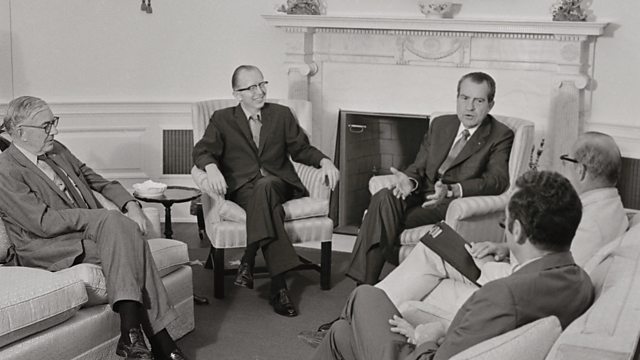Inflation and the cost of living
The 'Nixon Shock' in 1971, Bulgaria's cash crisis in 1997, and India's 'onion election' in 1980. Plus stories from the Darayya massacre in 2012 and the first Gay Games in 1982.
A compilation of witness accounts from when inflation and the cost of living were seriously affecting people's lives, among other topics.
In 1971, inflation was a huge problem in the USA so the President, Richard Nixon, made one of the most drastic moves in economic history; abandoning the Gold Standard. It became known as the 'Nixon Shock' and nearly caused a trade war between America and its allies. But, it also saved the US economy from a crisis. Ben Henderson spoke to Bob Hormats, an economic adviser in the Nixon administration, who was at the heart of decision-making.
In 1997, Bulgaria was in financial meltdown with hyperinflation making money worth a lot less. The country had emerged out of communism following the fall of the Soviet Union in 1989. Like other post-Soviet regimes, the country found the transition from communism to capitalism harder than expected. The President of Bulgaria, Petar Stoyanov, knew he had to do something and a recovery plan from one of Ronald Reaganβs key economic advisers was on the table. But would it work? Matt Pintus has been speaking to Steve Hanke, an economics professor.
In January 1980, Indira Gandhi's Congress (I) party was voted into power in India. Before the election, inflation meant that the cost of onions was unaffordable for many Indians. The price of the vegetable became a political hot potato in the election campaign. Reena Stanton-Sharma spoke to Suda Pai, a former Professor of Political Science at Jawaharlal Nehru University, Delhi.
In 2012, Syrian government soldiers surrounded Darayya, a suburb of Damascus, bombing buildings and searching for people who had spoken out against President Assad. Hundreds of people died over four days in what was described by activists as a βmassacreβ. Mohamad Zarda has been speaking to Laura Jones.
It has been 40 years since the first Gay Games were held in San Francisco in 1982. Attracting a large crowd and featuring more than 1,000 athletes from more than 100 countries, the event was organised by a group of LGBT activists, including former Olympians, to raise awareness of homophobia in sport. The Gay Games are now held every four years at venues around the world. In 2019, Ashley Byrne spoke to organiser Sara Waddell Lewinstein and athlete Rick Tomin. A Made in Manchester production for ΒιΆΉΤΌΕΔ World Service.
(Photo: President Richard Nixon with his economic advisers in 1971. Credit: Bettmann via Getty Images)
Last on
More episodes
Next
Broadcasts
- Sat 27 Aug 2022 13:06GMTΒιΆΉΤΌΕΔ World Service News Internet
- Sun 28 Aug 2022 19:06GMTΒιΆΉΤΌΕΔ World Service
- Mon 29 Aug 2022 23:06GMTΒιΆΉΤΌΕΔ World Service
Podcast
-
![]()
The History Hour
A compilation of the latest Witness History programmes


